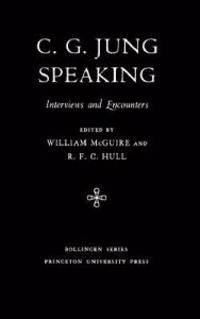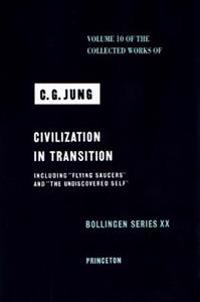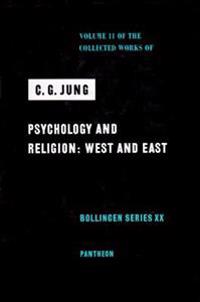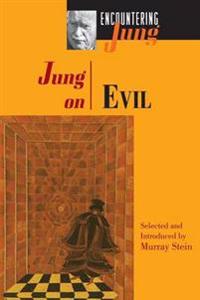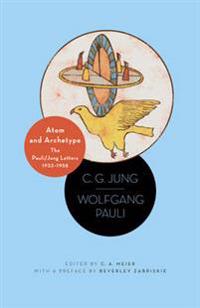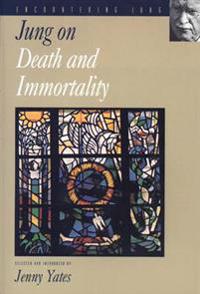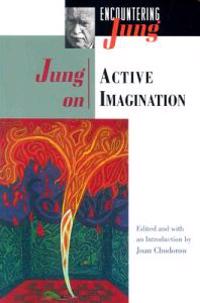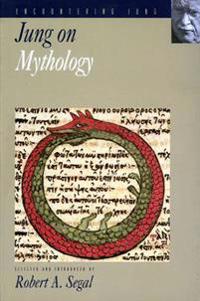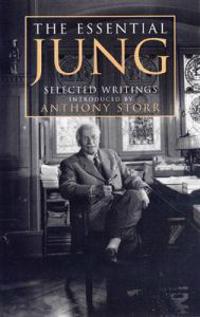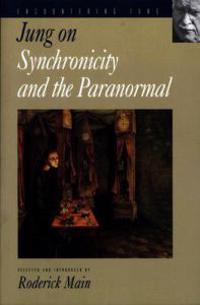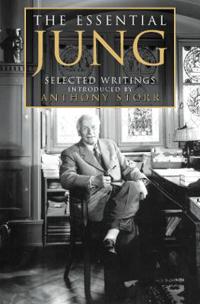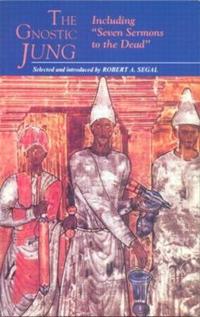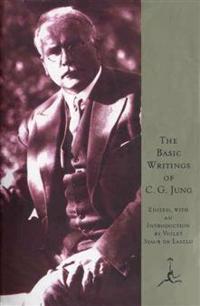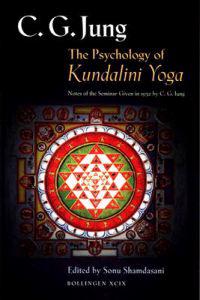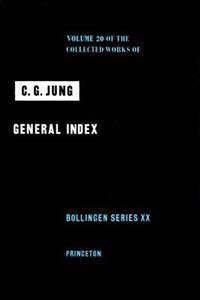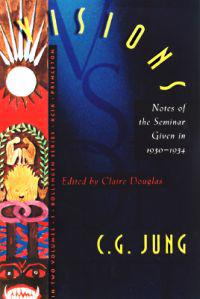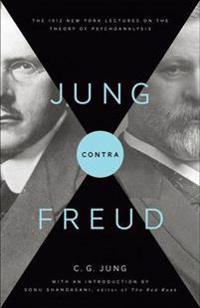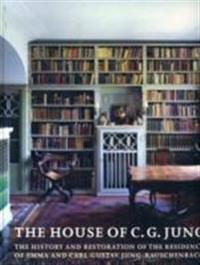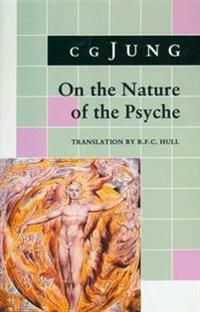C.G. Jung Speaking: Interviews and Encounters (Häftad)
avC. G. Jung, William McGuire
ISBN: 9780691018713 - UTGIVEN: 198702A collection of journalistic interviews which span Jung's lifetime. This book captures his personality and spirit in more than 50 accounts of talks and meetings with him. They range from transcripts of interviews for radio, television, and film to memoirs written by notable personalities.[...]
Collected Works of C.G. Jung, Volume 10: Civilization in Transition (Inbunden)
avC. G. Jung, Herbert Edward Read, , Bollingen Series, 20
ISBN: 9780691097626 - UTGIVEN: 197008Essays bearing on the contemporary scene and on the relation of the individual to society, including papers written during the 1920s and 1930s focusing on the upheaval in Germany, and two major works of Jung's last years, "The Undiscovered Self" and "Flying Saucers."[...]
Collected Works of C.G. Jung, Volume 11: Psychology and Religion: West and East (Inbunden)
avC. G. Jung, Michael Fordham
ISBN: 9780691097725 - UTGIVEN: 197001Sixteen studies in religious phenomena, including "Psychology and Religion" and "Answer to Job."
Collected Works of C.G. Jung, The: v. 5: Symbols of Transformation (Inbunden)
avC. G. Jung
ISBN: 9780691097756 - UTGIVEN: 1967-09-01Zofingia Lectures, The: (Supplementary Volume A of the Collected Works of C.G. Jung) (Inbunden)
avC. G. Jung
ISBN: 9780691098999 - UTGIVEN: 1983-11-01Jung on Evil (Häftad)
avCarl Gustav Jung, C. G. Jung, Jung
ISBN: 9780691026176 - UTGIVEN: 199607Well-known for his articulation of the "shadow side" of human individuality and culture, C. G. Jung wrote a great deal about the question of evil throughout his life and in scattered places in his work. In this book his position is pieced together from many sources. In his early work on the unconsci[...]
Atom and Archetype: The Pauli/Jung Letters, 1932-1958 (Häftad)
avC. G. Jung, Wolfgang Pauli, C. A. Meier
ISBN: 9780691161471 - UTGIVEN: 2014-07In 1932, world-renowned physicist Wolfgang Pauli had already done the work that would win him the 1945 Nobel Prize. He was also suffering after a series of troubling personal events. He was drinking heavily, quarrelling frequently, and experiencing powerful, disturbing dreams. Pauli turned to C. G. [...]
Jung on Death and Immortality (Häftad)
avCarl Gustav Jung, C. G. Jung, Jenny Yates
ISBN: 9780691006758 - UTGIVEN: 199910"As a doctor, I make every effort to strengthen the belief in immortality, especially with older patients when such questions come threateningly close. For, seen in correct psychological perspective, death is not an end but a goal, and life's inclination towards death begins as soon as the meridian [...]
Jung on Active Imagination (Häftad)
avCarl Gustav Jung, C. G. Jung, Joan Chodorow M. D.
ISBN: 9780691015767 - UTGIVEN: 199707All the creative art psychotherapies (art, dance, music, drama, poetry) can trace their roots to C. G. Jung's early work on active imagination. Joan Chodorow here offers a collection of Jung's writings on active imagination, gathered together for the first time. Jung developed this concept between t[...]
Jung on Mythology (Häftad)
avCarl Gustav Jung, C. G. Jung, Robert A. Segal
ISBN: 9780691017365 - UTGIVEN: 199807At least three major questions can be asked of myth: what is its subject matter? what is its origin? and what is its function? Theories of myth may differ on the answers they give to any of these questions, but more basically they may also differ on which of the questions they ask. C. G. Jung's theo[...]
The Essential Jung: Selected Writings Introduced by Anthony Storr (Häftad)
avCarl Gustav Jung, C. G. Jung, Anthony Storr
ISBN: 9780691029351 - UTGIVEN: 1999-12This volume presents the essentials of Jung's thought in his own words. To familiarize readers with the ideas for which Jung is best known, the British psychiatrist and writer Anthony Storr has selected extracts from Jung's writings that pinpoint his many original contributions and relate the develo[...]
Jung on Synchronicity and the Paranormal (Häftad)
avCarl Gustav Jung, C. G. Jung, Roderick Main
ISBN: 9780691058375 - UTGIVEN: 199810C. G. Jung had a lifelong interest in the paranormal that culminated in his influential theory of synchronicity. Combining extracts taken from the "Collected Works"; letters; the autobiographical "Memories, Dreams, Reflections; "and transcripts of seminars, "Jung on Synchronicity and the Paranormal"[...]
Essential Jung (Häftad)
avC. G. Jung
ISBN: 9780006530657 - UTGIVEN: 199806This compact volume of extracts from the 20 volumes of Jung's published writings, presents him clearly, in his own words and in precis. It is proposed that Jung's writing is the key to understanding 20th-century psychology, psychiatry and psychoanalysis.[...]
The Gnostic Jung (Pocket)
avC. G. Jung
ISBN: 9780415080385 - UTGIVEN: 1992-10Gnosticism was for C.G. jung the chief prefiguration of his analytical psychology. In this volume Robert Segal, an authority on theories of myth and Gnosticism, has searched the Jungian corpus for Jung's main discussions of this ancient form of spirituality. The progression in Gnosticism from sheer [...]
Jung On Evil (Pocket)
avC. G. Jung
ISBN: 9780415089708 - UTGIVEN: 1995-08-24Evil became a central issue for Jung as he grew older. This text brings together a key selection of Jung's writings to provide an accessible account of Jung's thought on evil.[...]
Jung On Synchronicity And The Paranormal (Pocket)
avC. G. Jung
ISBN: 9780415155090 - UTGIVEN: 1997-08-07Roderick Main brings together a selection of both the well-known and less acessible of Jung's writings on psychic phenomena and synchronicity. His introduction sets out clearly the theory of synchronicity, clarifying the more complex issues.[...]
The Basic Writings of Jung (Inbunden)
avC. G. Jung
ISBN: 9780679600718 - UTGIVEN: 199705In exploring the manifestations of human spiritual experience both in the imaginative activities of the individual and in the formation of mythologies and of religious symbolism in various cultures, C. G. Jung laid the groundwork for a psychology of the spirit. The excerpts here illuminate the conce[...]
The Psychology of Kundalini Yoga: Notes of the Seminar Given in 1932 by C. G. Jung (Häftad)
avCarl Gustav Jung, Sonu Shamdasani
ISBN: 9780691006765 - UTGIVEN: 199907"Kundalini yoga presented Jung with a model of something that was almost completely lacking in Western psychology--an account of the development phases of higher consciousness.... Jung's insistence on the psychogenic and symbolic significance of such states is even more timely now than then. As R. D[...]
Jung on Christianity (Övrig)
avC. G. Jung
ISBN: 9780691006970 - UTGIVEN: 1999-09-22C. G. Jung, son of a Swiss Reformed pastor, used his Christian background throughout his career to illuminate the psychological roots of all religions. Jung believed religion was a profound, psychological response to the unknown - both the inner self and the outer worlds - and he understood Christia[...]
Collected Works of C.G. Jung, Volume 20: General Index (Inbunden)
avGerhard Adler, Barbara Forryan, Carl Gustav Jung
ISBN: 9780691098678 - UTGIVEN: 1979-04An exceptionally comprehensive index by paragraph numbers. Certain subjects are treated in separate sub-indexes within the General Index. These include alchemy, animals, the Bible, colors, Freud, Jung, and numbers.[...]
Visions: Notes of the Seminar Given in 1930-1934 by C. G. Jung (Inbunden)
avCarl Gustav Jung, Claire Douglas, Claire Douglas
ISBN: 9780691099712 - UTGIVEN: 1997-12For C. G. Jung, the beautiful and gifted 28-year-old Christiana Morgan was an inspirational and confirming force whose path in self-analysis paralleled his own quest for self-knowledge. By teaching Morgan the trance-like technique of active imagination, Jung launched her on a pilgrimage of archetypa[...]
Jung Contra Freud: The 1912 New York Lectures on the Theory of Psychoanalysis (Häftad)
avC. G. Jung, Sonu Shamdasani
ISBN: 9780691152516 - UTGIVEN: 201112In the autumn of 1912, C. G. Jung, then president of the International Psychoanalytic Association, set out his critique and reformulation of the theory of psychoanalysis in a series of lectures in New York, ideas that were to prove unacceptable to Freud, thus creating a schism in the Freudian school[...]
Jung Lexicon (Pocket)
avDaryl Sharp, C. G. Jung, Daryl Sharp
ISBN: 9780919123489 - UTGIVEN: 1990-12The House of C.G. Jung (Inbunden)
avAndreas Jung, Regula Michel, Judith Rohrer
ISBN: 9783905681413 - UTGIVEN: 2010-06On the Nature of the Psyche: (From Collected Works Vol. 8) (Häftad)
avCarl Gustav Jung, C. G. Jung, G. Adler
ISBN: 9780691017518 - UTGIVEN: 1969-06Extracted from Volume 8. Includes the title essay and "On Psychic Energy."

